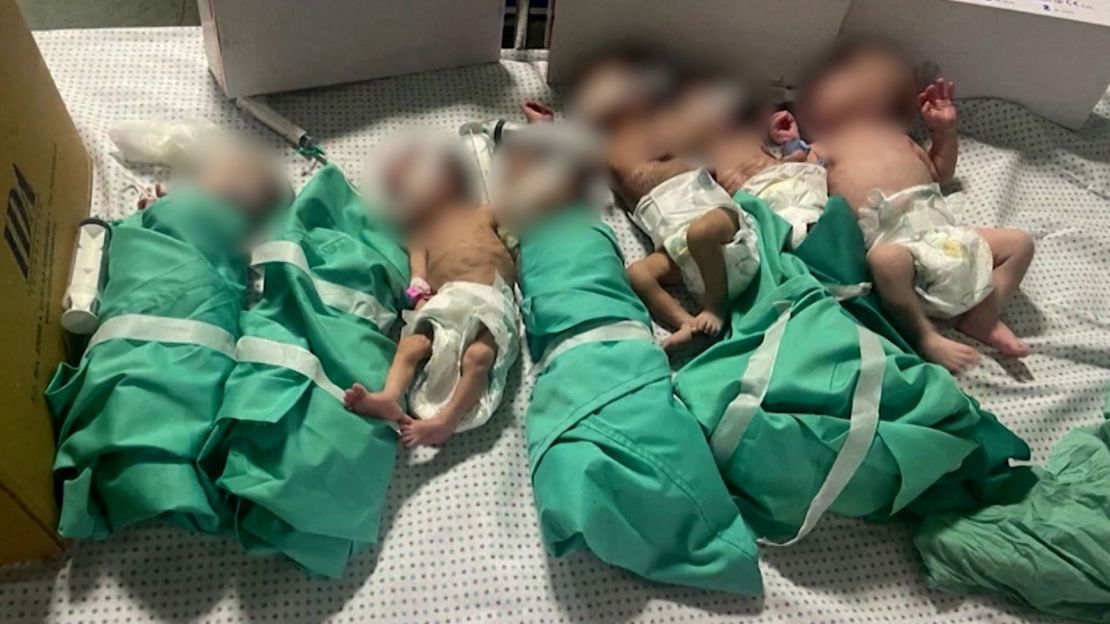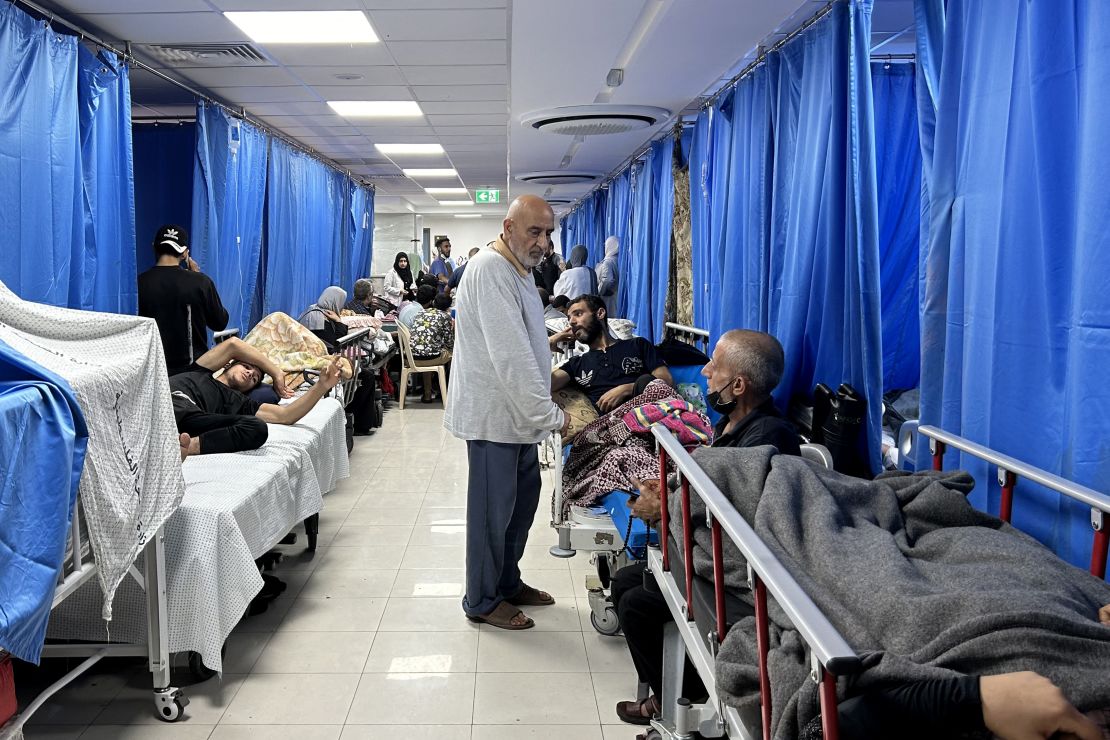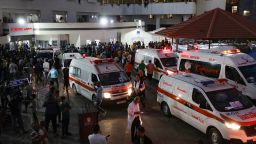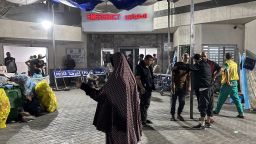Premature babies at Gaza’s largest hospital are being wrapped in foil and placed next to hot water in a desperate bid to keep them alive in “catastrophic” conditions, the hospital director has warned, as Israeli firepower pounds surrounding streets and remaining fuel reserves dry up, leaving the facility unable to function.
Staff at the Al-Shifa hospital were fighting to keep the newborns alive and warm after oxygen supplies ran out and they had to move the babies by hand from the neonatal unit’s incubators to a different part of the hospital. Meanwhile, a reporter for the Al Arabiya network who was inside the hospital told CNN that people were trapped there, too scared to flee due to the heavy fighting.
“There is no more water, food, milk for children and babies… the situation in the hospital is catastrophic,” the director of the medical center, Dr. Muhammad Abu Salmiya, told CNN on Monday.
Images show several newborn?babies?who were taken from incubators at the hospital placed together in one bed.
In recent days, 15?patients have died?at Al-Shifa, among them?six?newborns, due to power outages and a shortage of medical supplies, according to the Palestinian Ministry of Health in Ramallah, which draws its figures from the Hamas-controlled territory.
It comes amid Israel’s unrelenting bombardment and blockade of Gaza, an already impoverished and densely packed territory, following the deadly October 7 attack on its territory by Hamas militants.
Dr. Medhat Abbas, the director general of Gaza’s health ministry, told CNN that medical staff at Al-Shifa kept four infants alive after their mothers died by performing C-sections. “Now they have to make it without their mothers and without electricity… Can you imagine that?” he said in a voice note.
“When these babies are born prematurely, to sustain their lives they need to have the same temperature of the?ir mother. This temperature can only be offered in the incubators, which are heated properly,” Abbas said.
He warned that the situation would only worsen as winter draws in.
An Israeli military spokesperson told CNN on Saturday its forces were engaged in?“ongoing intense fighting” against Hamas?in the vicinity of the hospital complex, but denied firing at the northern Gaza medical center and rejected?suggestions the hospital is under siege.
Asked about the hospitals in Gaza at an unrelated Oval Office event Monday, President Joe Biden told reporters, “hospitals must be protected.”
Israel has repeatedly claimed there is a Hamas command center underneath Al-Shifa hospital, which Hamas and hospital officials have denied. The Israeli military has also previously accused Hamas of embedding itself in civilian infrastructure. CNN cannot independently verify the Israel Defense Forces’ (IDF) claims.
A US official with knowledge of American intelligence told CNN Monday that Hamas has a?command?node?under the?Al-Shifa hospital, uses fuel intended?for it,?and its?fighters regularly cluster in and around the hospital.


Working by candlelight
A freelance journalist inside Al-Shifa described dozens of bodies yet to be buried, ambulances that were unable to collect the wounded, and life-support systems with no electricity to function. Medics were working by candlelight, food was being rationed and people inside were starting to drink pipe water, the journalist said late Saturday.
CNN also spoke to a reporter for the Al Arabiya network, Khader al Zaanoun, who is inside the hospital.
“Communication is very bad and almost impossible for us to report what is happening in the hospital and its yards, we barely have cell lines but no internet,” he said.
“No-one can move or dare to go out of the hospital, the staff here are aware of many strikes that are happening around the hospital, we see smoke coming up from those strikes and we know?that there are people in some of those buildings but ambulances do not make their way out of the hospital because… during the last days an ambulance was hit on its way out of the hospital.”
Abu Salmiya, the director of Al-Shifa, told CNN that 7,000 displaced people were desperately trying to shelter in Al-Shifa hospital with about 1,500 patients and medical staff.
Inside the hospital, none of the operating rooms are functioning due to a lack of electricity, Abu Salmiya told Al Araby TV, adding that “whoever needs surgery dies, and we cannot do anything for him.”
“Now the wounded come to us and we cannot give them anything other than first aid,” he said.
The World Health Organization says Al-Shifa has been without power for three days. “Regrettably, the hospital is not functioning as a hospital anymore,” it said.
The spokesman for the Hamas-controlled health ministry in Gaza, Dr. Ashraf al-Qidra, said over the weekend that the intensive care unit, pediatric department and oxygen devices were out of service.
Al-Shifa is far from alone.?On Sunday, the Palestine Red Crescent Society announced that Al-Quds Hospital, another major facility in Gaza City, was out of service. The PRCS said the hospital – the second largest in Gaza – was “no longer operational. This cessation of services is due to the depletion of available fuel and power outage.”
Israeli airstrikes have killed at least 11,180 people, including 4,609 children and 3,100 women, according to the health ministry. At least 28,200 people have been injured.
Israel’s blockade on essential supplies including fuel entering Gaza has deepened a humanitarian crisis as hospitals, water systems, bakeries and other?services reliant on electricity shut down.
Volker Türk, the UN High Commissioner for Human Rights, said on Wednesday that both Hamas and Israel had committed war crimes in the past month.
‘If they are left behind, they will die’
Dr. Munir Al-Bursh, the director-general of the Hamas-controlled health ministry, said Monday that medical staff at Al-Shifa had refused an IDF evacuation order because they fear approximately 700 patients will die if they are left behind.
“The problem is not the doctors, it’s the patients. And if they are left behind, they will die, and if they are transferred they will die on the way, this is the problem, we are talking about 700 patients,” Al-Bursh told CNN on Monday.
“There has been no response until now by the doctors, but some of the displaced people and families have already been leaving.”
The evacuation order, according to Al-Bursh, is not coordinated with any international humanitarian agencies, such as the International Red Cross. The lack of coordination raises concerns about the safety and feasibility of transferring such a large number of patients, many of whom are in critical condition and will die in transport, he said.
CNN has requested comment from the IDF regarding Al-Bursh’s allegation that it has ordered the hospital’s evacuation.
Earlier on Monday, the IDF announced that an evacuation corridor for residents of northern Gaza had been reopened. IDF spokesperson Lt. Col. Richard Hecht said Sunday that the majority of people in Al-Nasr hospital and Al Rantisi Pediatric hospital, both in northern Gaza, had been evacuated.
Israeli Prime Minister Benjamin Netanyahu said in an?interview with CNN?on Sunday that there’s “no reason” patients can’t be evacuated from Al-Shifa. Netanyahu told CNN that Israel is helping patients by establishing corridors on the ground and said that “100 or so” have already been evacuated from the hospital.
CNN cannot independently verify whether any people have been able to evacuate.
CNN has previously documented Palestinian civilians being killed by Israeli strikes around evacuation zones, underscoring the reality that evacuation zones and warning alerts from the IDF haven’t guaranteed safety for civilians in the densely populated Gaza Strip.
International calls for a ceasefire continue to mount as global leaders pile pressure on Israel over the spiralling civilian death toll, and?huge crowds?gather in cities?around the world for pro-Palestinian protests. But Netanyahu reiterated to CNN on Sunday that the only halt in fighting he would accept is “one in which we have our hostages released.”
The Israeli military estimates 240 hostages are being held by Hamas in Gaza, including civilian men, women and children. The militant group has released just four hostages – two elderly Israeli women and an American mother and daughter – while the?Israeli forces?said they had rescued an Israeli soldier.
Israeli troops on Sunday continued their ground operation in Gaza by going deeper into Gaza City,?army spokesperson Rear Adm. Daniel?Hagari?said in a press briefing. Infantry and combat engineering forces?reached the outskirts of al-Shati refugee camp in Gaza, Hagari said, which is near Al-Shifa hospital. Meanwhile, army forces in coordination with the Navy raided the Gaza marina area and are currently in the areas to its east.
Dispute over fuel offer
On Sunday, the Israeli military said it had put 300 liters of fuel at the entrance to the?Shifa?hospital complex, but that Hamas had blocked the hospital from receiving it.?Abu Salmiya told Al Araby TV that staff had been too scared to go out to get it.
“We told the Israeli army that the 300 liters of fuel they offered is not enough to operate the hospital for 30 minutes,” Abu Salmiya told CNN. He said Monday that the hospital had asked the IDF for 600 liters of fuel for every hour to power its generators, but that the IDF had yet to respond.
The IDF released a video it said showed soldiers delivering the jerry cans to a?curbside?location near the hospital entrance. It also released an audio recording, purportedly of a hospital official accusing a Hamas leader at the health ministry of refusing to allow it to be collected.
Abu Salmiya said it was the presence of Israeli tanks that had prevented collection.
“Of course, my paramedic team was completely afraid to go out,” he said, adding: “We want every drop of fuel, but I told (the IDF) that it should be sent through the International Red Cross or through any international institution.”
Hamas dismissed the allegations and said the Israeli fuel delivery was a propaganda stunt.
This story is being updated with additional developments.
CNN’s Kareem El Damanhoury, Jonny Hallam, Jomana Karadsheh, Niamh Kennedy, Tamar Michaelis, Heather Chen, Manveena Suri, Zeena Saifi, Eyad Kourdi and Sana Noor Haq contributed reporting.




